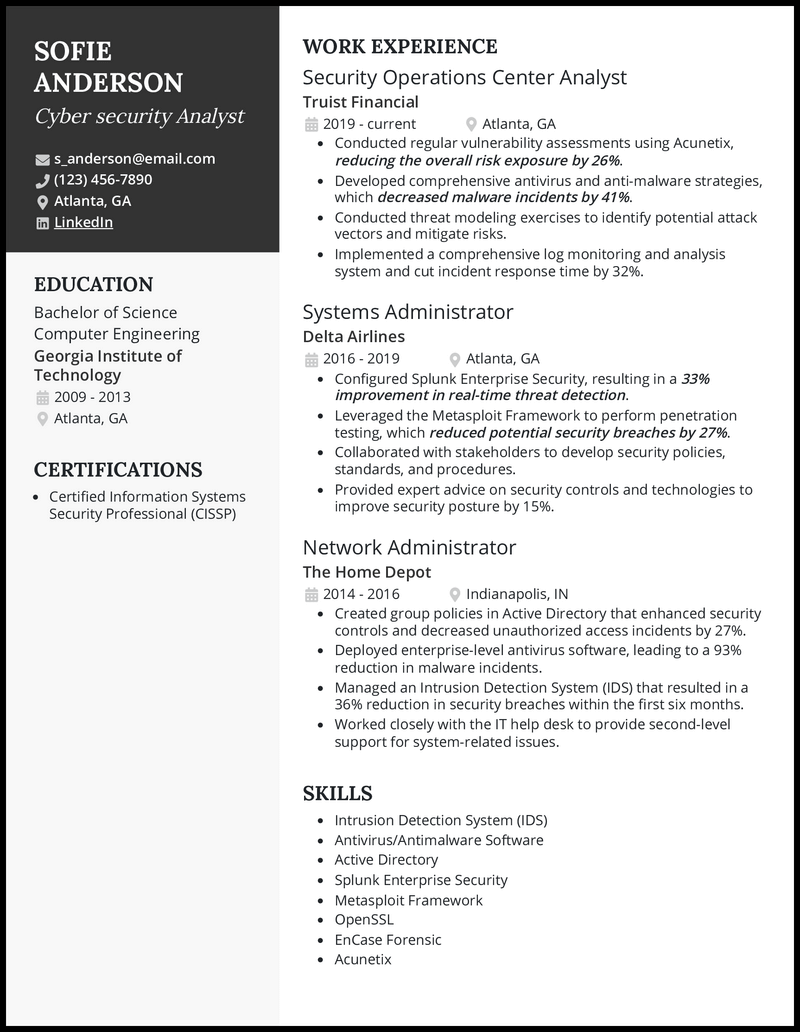As a cyber security analyst, you have a keen eye for identifying vulnerabilities and implementing effective defense strategies. Your work is essential in safeguarding networks, data, and infrastructure.
Your days are filled with monitoring, assessing, and fortifying data and infrastructure. It’s no wonder that creating a resume and writing an effective cover letter might feel like a challenge—it’s an entirely different task.
Not to worry—we’re here to help. We’ve analyzed countless resumes and created our cyber security analyst resume examples. Read our resume tips and recommendations to level up your career!
Related resume examples
What Matters Most: Your Knowledge of Cyber Security & Work Experience

You’re the protector of networks, standing vigilant in the face of various cyber security threats. You combine sharp critical thinking and expertise in tools like Wireshark and Nessus to get the job done.
While your problem-solving and attention to detail are vital to your success as a cyber security analyst, don’t list them directly in your resume. Instead, shift your focus to technical skills, including software, frameworks, and network tools.
List your areas of focus, like cloud security or compliance, but also your digital toolkit. For instance, mention your expertise in Wireshark and Snort for network analysis, Qualys for cloud security, and Metasploit for penetration testing.
9 most popular cyber security analyst skills
- Intrusion Detection
- Incident Response
- Splunk
- Wireshark
- Qualys
- Metasploit
- Kali Linux
- OpenSSL
- Nessus
Sample cyber security analyst work experience bullet points
You juggle various tools to identify cyber threats before they become critical. However, to stand out to recruiters, don’t just talk about your daily responsibilities—instead, draw attention to your achievements.
Just as you use Wireshark and Splunk to analyze networks and data, allow recruiters to get a sense of your value in a tangible way. To do this, support your achievements, where possible, with concrete metrics.
For example, instead of just saying that you conduct weekly network vulnerability assessments, say that you reduced yearly system risks by 44%. Similarly, if you helped manage a cybersecurity budget, specify its size to give recruiters an insight into the scope of your experience.
Here are a few examples:
- Implemented advanced intrusion detection systems, leading to a 32% decrease in security incidents
- Conducted regular vulnerability assessments using Acunetix, reducing overall risk exposure by 26%
- Implemented a comprehensive log monitoring and analysis system and cut incident response time by 32%
- Automated threat detection using Python scripts, increasing threat identification efficiency by 28%
Top 5 Tips for Your Cyber Security Analyst Resume
- Elaborate on threat detection strategies
- Rather than a vague mention of threat detection, get into the specifics of the strategies you implemented and their impact. For instance, talk about the specific intrusion detection systems or behavior analytics you used to proactively reduce cyber attacks by 23%.
- Highlight your incident response
- To emphasize your prowess at handling security incidents, specify any incident response plans you’ve developed and implemented. Take it a step further by including the resulting improvement in the average time taken to contain and mitigate security breaches.
- Emphasize threat intelligence
- Keeping tabs on various sources is crucial in cyber security, so highlight it in your resume. Talk about seminars you’ve attended or publications you follow, underscoring how this helps you find new security measures to implement, preventing breaches.
- Detail security awareness
- If you’ve helped contribute toward the security-conscious culture within your company, dive into the details of how you did that. For example, you could outline any security awareness programs or training you’ve spearheaded, emphasizing how it helped decrease security incidents.
- Showcase your compliance
- Compliance is crucial to cyber security, so showing a compliance-focused mindset can help set you apart. Demonstrate your success in adhering to regulatory requirements like GDPR and HIPAA by outlining the high compliance rates you maintained throughout your career.
In most cases, it’s best to try and keep your work experience succinct, making sure your resume fits into a single page. However, if you have more than 10 years of experience in cyber security, it’s fine to extend this to two pages.
If you have relevant certifications, such as CISSP, CISM, CEH, or CompTIA Security+, they’re definitely worth highlighting in your resume. While these certifications aren’t always necessary, they help set you apart from other candidates.
While the focus of your resume has been your achievements and quantifiable metrics to support them, your cyber security cover letter lets you elaborate on them. For instance, go into detail on the thought process behind the cloud migration you spearheaded, and why you opted to secure it using Qualys.








